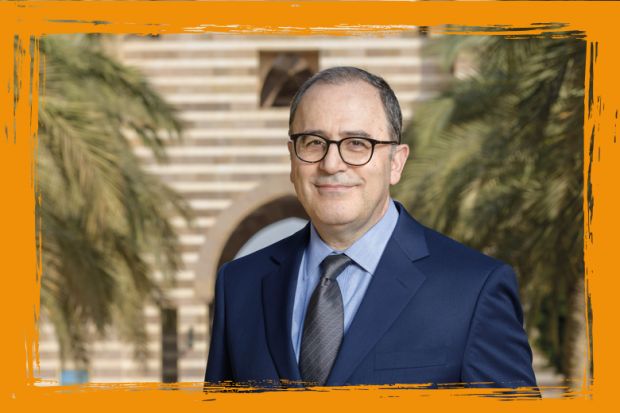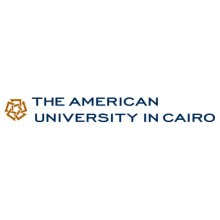Browse the full results of the Arab University Rankings 2023
The average global citizen will change career 12 times in their life, Ahmad Dallal tells me.
While the president of the American University in Cairo (AUC) might be slightly below that average himself, he has certainly had his fair share of career crossroads: rejecting the chance to study medicine and opting for engineering; working in aircraft maintenance but shifting to academia; and becoming a top scholar in Islamic studies before moving into university administration.
It makes sense, then, that one of his top priorities since taking over as AUC’s 13th president two years ago is equipping graduates for the future of work.
The institution is the only one in Egypt with a stand-alone School of Continuing Education (SCE), which aims to help reskill the growing number of people looking to change their professional paths.
“We recognise…that it is no longer sufficient to train students, give them a degree and that’s it,” says Dallal. “We should be able to intervene, to retrain, to provide microcredentials that will help those who have graduated but are working in a different environment.”
Established in 1924, the SCE will celebrate its 100th anniversary next year, having helped generations of Egyptians and students from the region find new directions in their work. Dallal, who sees it as one of AUC’s “key pillars that inform how we are approaching higher education”, has plans to scale it up further.
Growing up in Lebanon during a “turbulent period”, Dallal and his siblings appreciated the value that education brought, never taking this for granted, he says.
“There are people that are born with a head start, but in our case it wasn’t expected,” he adds. “We really needed to be disciplined, we valued the opportunities that we had and we made sure that we tried to make the best out of it.”
Yet despite being among the best pupils at his school, Dallal decided not to follow in his father’s footsteps and become a doctor – instead opting to study engineering, while also auditing history on the side.
After working in aircraft maintenance as a mechanical engineer for five years, he found himself at another junction, with the opportunity to attend graduate school. But instead he made the “bold decision” to leave engineering and embark on an academic career.
While his choices may have seemed haphazard at the time, he’s grateful for them now, believing that his experience in both the arts and the sciences stands him in good stead in his administrative roles.
“That combination exposed me to things that I wouldn’t have been exposed to if I was in one or the other,” he says. “It gives me a good perspective when I speak to families, when I speak to students that I probably wouldn’t have had if not for this accident.”
Dallal went on to become a prominent scholar of Islamic studies, teaching at a string of high-profile US institutions, including Yale, Stanford and Georgetown universities; he was also chair of the department of Arabic and Islamic studies at the last.
“I think this differentiates me from other administrators,” he notes, adding, “at heart I am an educator and I believe in the mission: shaping the lives of students and doing meaningful research.”
His path in university administration began while he was teaching at Georgetown, when he was headhunted to serve as provost of the American University of Beirut – preceding his appointment as dean of Georgetown University in Qatar.
But it is not a path he ever foresaw for himself until that point.
“Administration I call a necessary evil,” Dallal says. “Someone has to do it and it’s better if someone doing it appreciates the ideals of the educational mission, rather than someone who is just an administrator.”
Dallal’s prior experience means he is well used to working in US-style liberal arts universities – for which he thinks there is increasingly a need within Egypt and the region.
Being named as the first Arab to serve as president of the AUC is a “privilege”, but it is not one without challenges. His predecessor, Francis Ricciardone, had a widely reported falling out with faculty staff, while the devaluation of the Egyptian pound has caused tuition fees to soar and students to protest.
It’s a battle AUC is fighting on a daily basis – by introducing a new scholarship based on skills and need, and scaling up a financial aid programme.
“Eventually the economy will adjust to the devaluation and salary scales will change and so on, but we are not there yet and until we [are] people are suffering, so we want to be able to intervene,” he says.
AUC has raised staff salaries and bonuses two years in a row to help its employees weather the storm.
“Certainly it is a crisis; we recognise it as such,” he says. “We recognise the people who are affected by it and we are directing our resources to support them to the extent that we can.”
In a country that produces 700,000 high school graduates annually, AUC faces a challenge in finding the “right calibre” of student. But as a commuter university, it knows that, without financial assistance, many of the country’s best and brightest will be unable to attend.
“After recruiting them and providing them with financial help, we have to create an environment where they can succeed,” says Dallal.
Another focus for him is community service. The university recently succeeded in obtaining some of the biggest grants in its history for projects – including one that aims to train millions of students via employment training centres – which Dallal says are “humbling” to be a part of.
“We submit the proposals, we get the money but we don’t use them internally; we use them externally so that we serve,” he adds. “This is in the DNA of AUC, but we are being a lot more deliberate about it as we move forward.”
patrick.jack@timeshighereducation.com
This is part of our “Talking leadership” series with the people running the world’s top universities about how they solve common strategic issues and implement change. Follow the series here.
Register to continue
Why register?
- Registration is free and only takes a moment
- Once registered, you can read 3 articles a month
- Sign up for our newsletter
Subscribe
Or subscribe for unlimited access to:
- Unlimited access to news, views, insights & reviews
- Digital editions
- Digital access to THE’s university and college rankings analysis
Already registered or a current subscriber? Login









